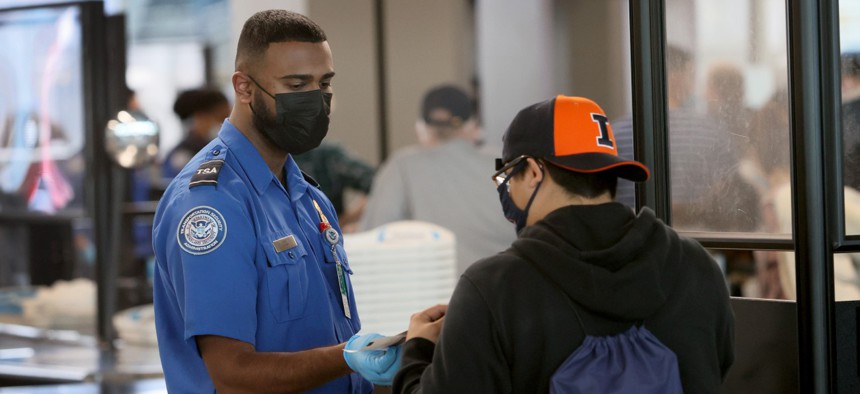
Transportation Security Administration workers screen passengers at O'Hare International Airport in Chicago on Nov. 08, 2021. The agency is moving staffers around to shore up heavily trafficked airports. Scott Olson/Getty Images
TSA Prepares for Busy Season Surge, but Officials Still Warn of Potential 'Train Wreck'
The agency will offer new hires up to $5,000 in bonuses and mandate overtime.
U.S. travelers are finally ramping up their airport trips to pre-pandemic levels and the Transportation Security Administration is taking drastic action to prepare for the flood of passengers.
Those steps will include offering signing bonuses of up to $5,000 for some new hires and moving around 1,000 employees to account for heavily trafficked airports. TSA is currently offering bonuses of up to $2,000, half of which is delivered upon employees’ onboarding and the other half after they complete one year of service. The agency is taking those steps as it has projected that passenger volume will surpass those of 2019 for the first time since the outbreak of COVID-19.
TSA is offering retention incentives in hard-to-hire markets and is increasing overtime, including, in some cases, mandating it. One career executive in the field told Government Executive the agency is 30% down its targeted staffing level in some areas and requiring screeners to work six days per week and take overtime. It is offering these employees up to $200 per pay period as an incentive for this extra work in addition to the overtime pay.
“This is a very competitive labor market,” TSA Administrator David Pekoske said at an agency town hall last week. “We want to retain all the talent we have within the agency…and the incentives we provide are really important.”
The busy travel season officials lasts all summer, designated as late-May until past Labor Day. TSA has 47,500 screeners on board and is also deploying new technologies to airports around the country in hopes of expediting the screening process. Sonny Lorrius, a TSA spokesman, acknowledged travelers may experience some delays as the new equipment is installed.
TSA maintains a cadre of national deployment officers who are sent to airports when the agency expects standard lines to surpass 30 minutes or Pre-Check lines to surpass 10 minutes. That group has 1,000 employees who have volunteered for deployments from their home airports. The agency is also converting part-time employees to full-time staff, Lorrius said.
The TSA career executive said there is still a “terrible problem” with staffing levels and some airports are likely to experience long lines this summer. While the pay incentives may help, he said, the agency is still losing employees as it is still taking several months to onboard new staff and many applicants choose not to wait.
At headquarters, he said, “they think they’re doing a lot but from the perspective of the field they’re not doing much at all.” He added employees are getting burned out after working six days a week and are increasingly calling out sick. “They’re looking at a train wreck.”
TSA is now screening about 2.3 million passengers per day, up from a pandemic low-point of 100,000. The agency capped staffing during the pandemic due to decreased demand, while also allowing thousands of employees at a time to remain home on paid administrative leave when they felt uncomfortable coming to work due to an elevated risk of severe COVID-19 related illness. It began a hiring surge last year, hoping to bring on 6,000 new screeners, but its staffing still remains below pre-pandemic levels.
Barring additional court mandates, the Biden vaccine mandate for federal employees is set to go back into effect at the end of the month. As of the most recent data from December, 7% of the TSA workforce was out of compliance with the requirement.
Pekoske, whom Biden just renominated for another five-year term, said he is pushing congressional appropriators to provide additional funding to help boost its workforce. In his fiscal 2023 budget, President Biden proposed increasing funding for TSA pay and benefits by $1.6 billion compared with the 2021 enacted level to bring pay for the agency's workforce in line with the rest of the federal workforce.
“We are continuing our efforts to recruit and retain a workforce that is able to meet the increasing demands of passenger travel volume and maintain security effectiveness,” said Lorrius, the agency spokesman. “While passenger volume may be higher during certain periods, we work very hard to provide a positive screening experience for passengers, to include minimizing unnecessary wait times.”







